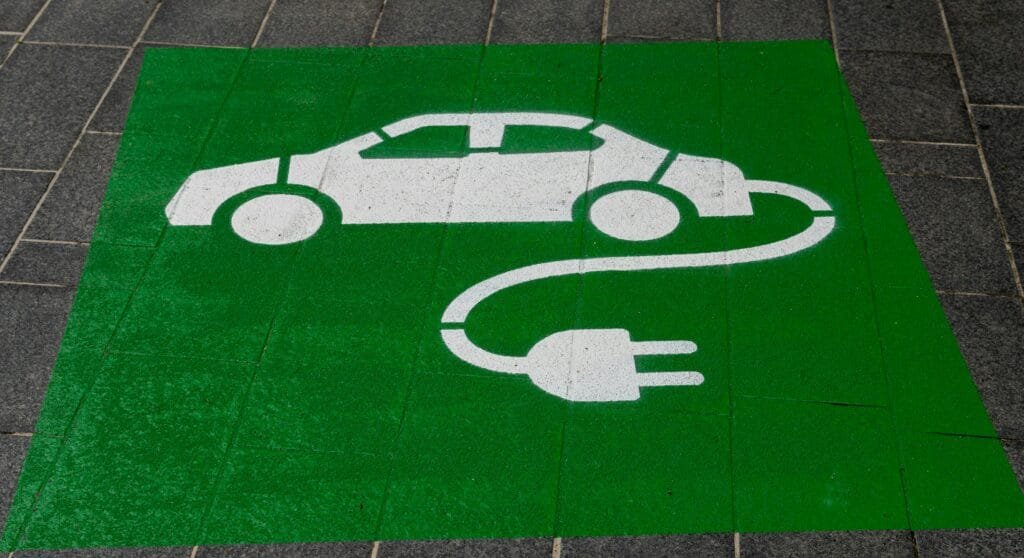Electric vehicles (EVs) are becoming more popular, which means the demand for EV charging stations is also increasing. If you own commercial property, adding EV charging stations can attract eco-conscious customers and generate additional revenue.
A Level 2 charging station costs around $6,000 to install and can recoup the investment in two years. Installing charging stations can also increase foot traffic, improve customer satisfaction, and give you a competitive advantage. If you’re curious about the ROI of charging stations, this quick guide will help you.

EV Charger Market: Growth and Potential
The electric vehicle market has been experiencing significant growth over the past years. According to research by GlobalData, the market is projected to grow at a rate of 15% each year between 2023 and 2025.
In the next decade, the rate of EV cars sold is expected to surpass 44 million. This creates increased potential for businesses to invest in EV charging stations.
The Benefits of EV Charging Stations for Businesses
Installing EV charging stations offers profound benefits for businesses. It enhances the company’s sustainability profile, thereby attracting eco-conscious customers and employees.
Also, providing EV charging can increase the time customers spend on the premises, which, in turn, can boost sales. For employees, access to EV charging stations is an added incentive, which can improve job satisfaction and retention.
Moreover, businesses may also qualify for government incentives or tax breaks related to green initiatives.
By integrating EV charging infrastructure into their operations, businesses position themselves as forward-thinking and environmentally responsible. This aligns with growing consumer preferences for sustainable practices and contributes to the broader adoption of electric vehicles.
How to Calculate the ROI of EV Charging Stations
Calculating the return on investment for an EV charging station is an important step in assessing the economic feasibility of this investment. To calculate the ROI, you need to use a simple formula:
ROI = (Total Revenue – Total Cost) / Total Cost x 100
Let’s break down each component:
Total Revenue: This includes all income from the charging station, like charging fees, advertising revenue, and other sources such as partnerships or sponsorships.
Total Cost: The charging station expenses include installation, operational, and maintenance and repair costs.
A positive ROI means profit, while a negative ROI means costs are higher than revenues. Long-term projections for costs and revenues are crucial, as initial years may have higher expenses and lower revenues.
Factors Impacting the ROI of Your EV Charging Station
To assess the financial viability and long-term benefits of investment in EV infrastructure, businesses need to understand the factors influencing EV charging stations’ ROI.
Tax Incentives and Rebates
Tax incentives and rebates are available for businesses looking to provide EV charging services. The IRS’ Alternative Fuel Vehicle Refueling Property Tax Credit in the United States offers a 30% credit on installation costs, capped at $100,000 per location as of 2023. This incentive lowers the financial barrier to entry and accelerates the return on investment.
In the United Kingdom, businesses can take advantage of the Workplace Charging Scheme (WCS). This voucher-based system contributes to the upfront costs of purchasing and installing EV charging stations.
UK businesses may also be eligible for enhanced capital allowances. This allows them to gain 100% tax relief in the first year on qualifying low-emission and electric vehicle charging equipment.
Installation and Operational Costs
Installation and operational costs play a crucial role in determining the ROI for EV charging stations. Let’s break down these costs:
Equipment and Installation Costs: Installing a Level 2 charger ranges from $1,300 to $2,800, including the equipment and installation. If you need three chargers, the cost could be $3,900 to $8,400. Other expenses may include building or parking lot renovations, permits, and related costs.
Networking Fees: Modern EV charging stations require smart capabilities such as payment processing, access control, and session management. Opting for software-enabled equipment is advisable for billing purposes, although some charging equipment may not require software. The annual software cost typically ranges from $100 to $300 per port.

Ongoing Maintenance: Regular maintenance ensures optimal uptime and reliability. This includes the upkeep of the equipment and site, contributing to ongoing operational costs.
Cost of Energy Sold: EV users’ energy cost varies based on location, time of use, and other factors. This directly impacts charging fees and revenue.
Operating Costs: Business-related expenses such as payroll and advertising are included in this category. The operating costs for EV charging stations are generally low.
Managing costs effectively is crucial to turning a profit in an EV charging station business. This means finding the right balance between the expenses of setting up and running the station, such as installation and operational costs, and the revenue generated from charging fees and other income sources, like advertising. High costs can significantly delay reaching the break-even point and starting to make a profit, so it’s important to be mindful of expenses.

Payment Structure
There are two different payment structures for you to consider. Both have benefits, but one may be more suited to your business’s specific needs.
Flat-fee Charging
Flat-fee charging is a pricing model that charges a uniform rate for a set amount of time. This pricing strategy works well for businesses and residential properties where customers are expected to park and charge for longer durations. It offers customers a consistent fee regardless of the energy consumed, making billing simple and convenient.
Metered Billing
Metered billing for EV charging is based on the amount of electricity consumed during charging, measured in kilowatt-hours. It’s a precise and fair way to bill customers for the energy they use.
This method suits locations where charging times are shorter or billing precision is necessary. This pay-per-use model ensures customers are billed directly for the energy their vehicle receives, making it an equitable solution for both quick charges and full recharges.
Are EV Charging Stations a Good Investment?
Investing in electric vehicle (EV) charging stations is more than just a sustainable move; it’s a strategic decision that can position businesses at the forefront of a growing market. As the adoption of EVs continues to surge, the demand for accessible charging solutions is increasing, making EV charging stations a profitable addition to any forward-thinking business model.
To capitalize on this opportunity, it’s essential to understand your customer base and location. Retail centers, office parks, and residential complexes can benefit significantly by providing EV charging as an amenity, enhancing customer satisfaction and potentially increasing dwell time and spending.

Moreover, integrating EV charging infrastructure can improve a company’s brand image, demonstrating a commitment to environmental stewardship and innovation. With available government incentives and the potential to generate additional revenue streams through charging fees and partnerships, the financial outlook for EV charging stations is compelling.
For businesses planning to embark on this journey, the key factors to consider include the electricity capacity of the site, the types of chargers that best suit your clientele, and the potential for future expansion. Partnering with reputable suppliers and leveraging smart charging solutions can optimize operations and improve user experience, making EV charging stations an investment in infrastructure, customer loyalty, and brand value.
Tips for Maximizing EV Charging Station ROI
To get the most out of EV charging stations, a strategic, data-driven approach is key. By leveraging location analytics, smart charging solutions, and charging station analytics, businesses can optimize revenue, enhance user experience, and identify expansion opportunities. Collaborating with EV manufacturers or local businesses can also drive more traffic to locations and create added value for users.
In addition, staying informed about government incentives and grants for EV infrastructure is crucial for offsetting initial costs and improving the financial outlook of the investment. By adopting these focused strategies, businesses can position themselves as leaders in the green economy, contributing to a sustainable future while ensuring a quick ROI.
Conclusion
The ROI of EV charging stations extends far beyond the immediate financial gains. As the EV market continues to expand, the demand for convenient, accessible charging options will surge, offering businesses a unique opportunity to capture new customers and foster loyalty among existing ones. For businesses ready to embark on this journey, EN Plus offers a comprehensive suite of EV charging solutions tailored to meet your specific needs.


